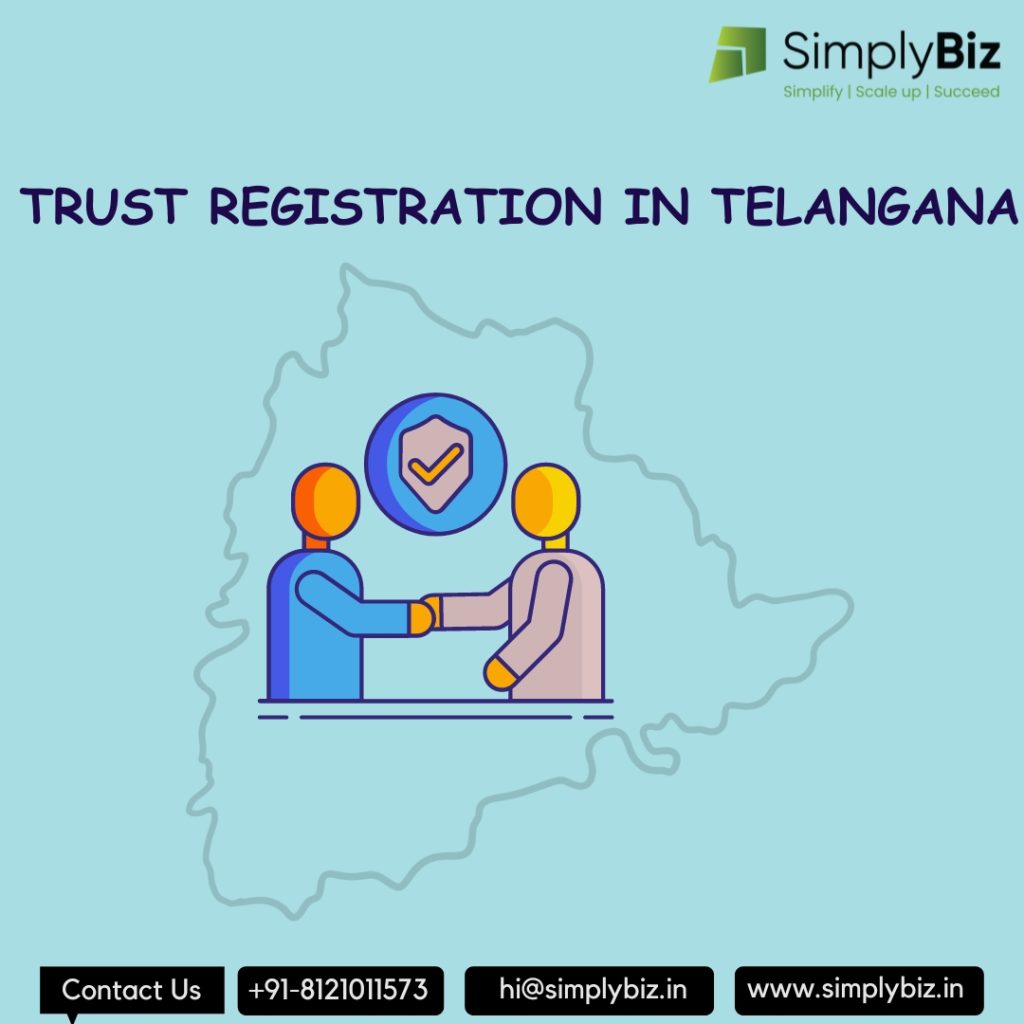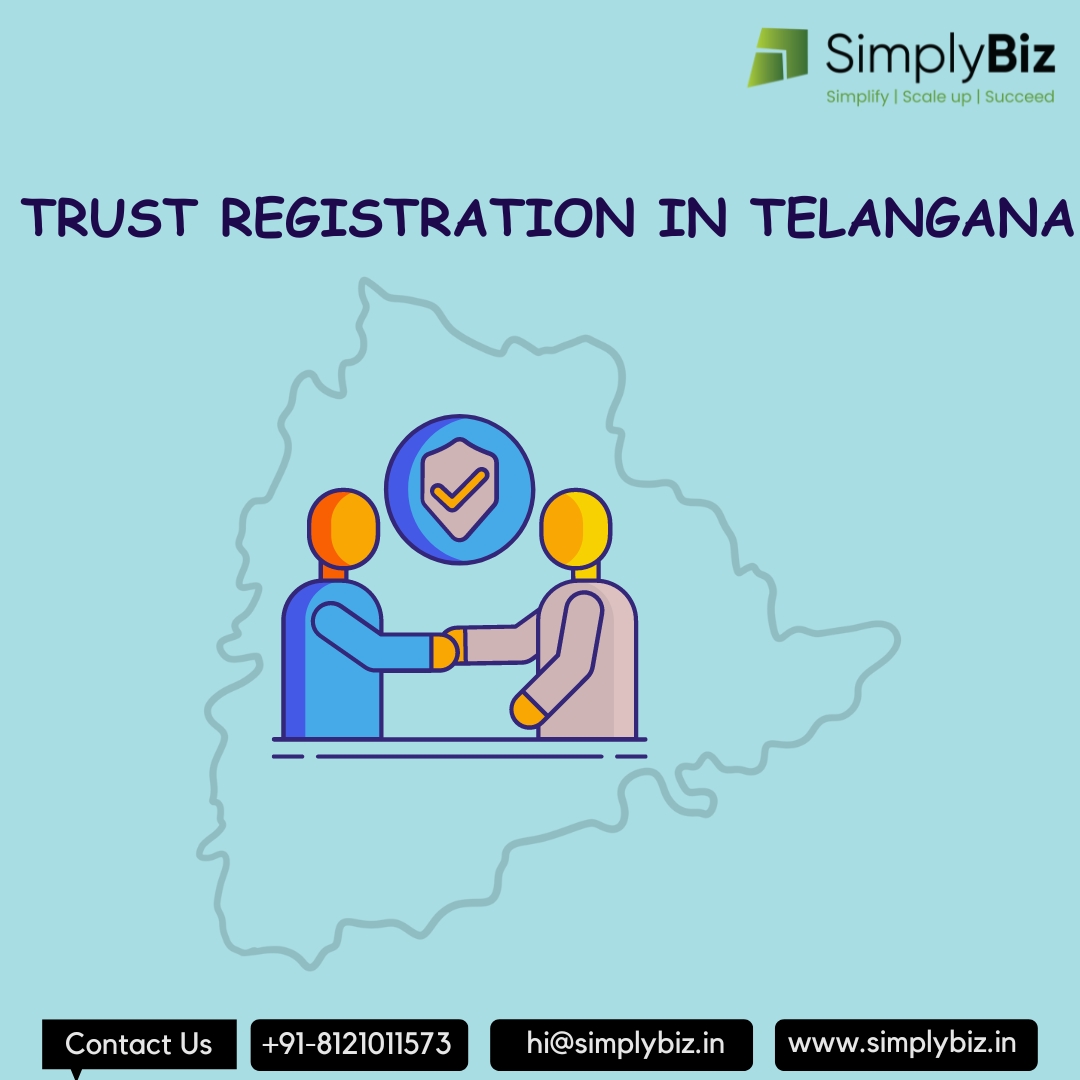Trust Registration in Telangana
Contributed by: Neha Kujur
Email id: Neha@simplybiz.in
Introduction
In India, any individual who is legally competent to enter into a contract has the authority to establish a Trust for any lawful purpose as per the Indian Trusts Act of 1882. When referring to a “lawful purpose,” it implies an objective outlined in Section 4 of the Act, which denotes purposes that are not prohibited by law and do not contravene legal provisions, engagement in fraudulent activities, or causing harm to individuals or their property, or have been deemed by the Court as immoral or against public policy.
Terminology
To gain a comprehensive understanding of the concept of Trust, it is essential to familiarize oneself with various terms commonly used in its definition. These terms include:
- Author of the Trust: The person who reposes or declares the confidence.
- Beneficiary: The person who accepts the confidence.
- Trust money/ property: subject matter of the trust.
- Trustee: The person or persons who manages the trust property or trust money.
- Trust Deed: the instrument by which the trust is declared.

Types of Trust
- Public Trust- In a public trust the beneficiary is the general public or a specified section of it. The beneficial interest is vested in an uncertain and fluctuating body of persons. Every charitable trust is only a public trust as benefit to the community at large or to a section of the community is of the essence of a valid charitable trust.
- Private Trust- In a private trust the beneficiaries are defined and ascertained individual(s).
Registration of a Trust in the state of Telangana:
In India, a trust can be registered for any lawful purpose with a minimum of 2 Trustees. The maximum number of Trustees can be specified in the Trust Deed. The registration process for a trust involves three main steps:
1. Pre-registration preparation
Pre-registration preparation entails ensuring the availability of the following documents:
a. Full name, father’s name, age, residential address, occupation of the Author of the Trust.
b. Full name, father’s name, age, residential address, occupation of the trustees.
c. Identity proofs of the Trustee (Adhaar Card, PAN Card)
d. Mobile numbers of the Trustee
e. Name of the proposed Trust
f. Address of the registered office of the proposed Trust
g.Proof of registered office
- NOC from the owner in case the registered office is self owned
- Rent agreement in case the registered office is a rented property
- Lease Deed in case the registered office is taken on lease
h. Corpus Fund- the amount/fund used to start the working of the Trust
i. Trust Deed
A Trust Deed inter-alia must contain the following:
- Nature of the Trust Deed (to be mentioned in the heading of the deed)
For example: Trust Deed for charitable purpose, Debenture Trust Deed, etc. - Name of the Trust
- Address of the registered office of the Trust
- Name and other details of the “Author of the Trust”
- Name and other details of the of the “Trustees”
- Name and other details of the of the “Beneficiaries”
- Aims and objectives of the Trust
- Corpus Fund
- Names and descriptions of the office bearers (if any)
- Functions of the office bearers (if any)
- Raising of funds and nature of expenditure
- Control in the Trust
- Powers of Trustees
- Receipts of contribution
- Meetings of the Trustees
- Properties (movable/ immovable) of the Trust
- Suits and legal proceedings
- Area of operation
- Declaration
j. Every trust deed must be witnessed by at least two witnesses
2. Presentation of the documents to the Sub-Registrar and payment of fee
Please be aware that the registration process for societies is exclusively conducted through offline channels. For further information and frequently asked questions (FAQs), individuals can visit the Telangana Meeseva Portal at https://registration.telangana.gov.in/.
Once all necessary documents are prepared, they must be submitted in hard copy format to the Sub-Registrar Office corresponding to the relevant jurisdiction.
The registration fee must be paid offline using a challan. The fee is determined based on the documents submitted at the Sub-Registrar office. Below is an approximate breakdown of the fee:
| S.No. | Particulars | Amount |
| 1. | Registration Fee | 3% of corpus fund |
| 2. | Stamp Duty | ₹1,500 |
| 3. | User charges | ₹550 |
| 4. | Stamp paper for Trust Deed | ₹100/500 |
3. Post submission procedure
Upon submission of the documents and payment of the necessary fee, the Sub-Registrar will proceed with the processing based on the submitted documentation. The prospective Trustees and witnesses are required to be present during the document inspection by the Sub-Registrar. Upon confirmation of satisfaction with the documentation and verification of all requirements, the registration order is issued, and the Certificate of Registration is subsequently provided.
Conclusion :
Trust creation has historically provided individuals and organizations with the means to instill confidence in a collective group, empowering them to oversee responsibilities that goes a long way. What’s remarkable is that the creation of trust isn’t solely a mechanism for serving society or the public on a grand scale; it can be created to serve an individual. One may find the entire process somewhat complicated, but as you progress, you see that it’s simultaneously engaging and captivating, as it involves visiting a government office and engaging with various officials. In an age where virtual solutions and convenience are prevalent, reverting to traditional methods offers a unique chance to gain insight into the inner workings of administrative procedures.
SimplySet-up is a one stop solution for the ones who are looking for setting up Trusts in Telangana. For further enquiries reach out to our Product Head – Ms. Geetanjli Aggarwal at the mail ID geetanjali@simplybiz.in or Simplysetup@simplybiz.in or +91 8121011571.


2 Replies to “Trust Registration in Telangana”
Trust formation Required
Thanks Mr. Ravindra Mohan,
Geetanjali from our side will revert within 48 hours